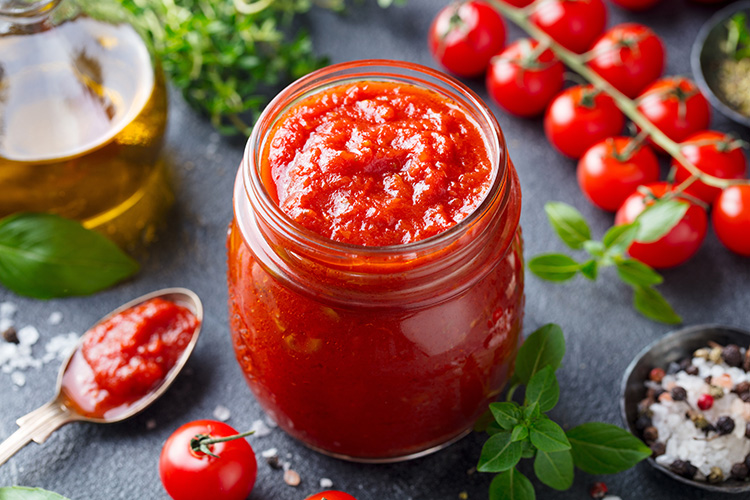Tomato shortage from adverse weather and disease conditions caused food manufacturers to scramble for supply or alternatives. Though there are a few tomato extenders available, Citri-Fi® citrus fiber, at less than 1% usage, provides optimal extension up to 25% while maintaining the natural tomato texture, color and flavor.
You say tomato. I say tomayto. Regardless, tomato and tomayto stem from the same fruit source which has disappear-ato. Recently, adverse weather and disease ripped thru the once thriving agricultural staple. As a result, tomato processors are converting less material which set a chain reaction in the food industry. Many food manufacturers scrambling to secure supply and/or find alternative solutions such as tomato extenders find themselves in dire straits.
This shortage is affecting numerous tomato-based products including tomato paste, sauces like pasta, pizza, and BBQ, salad dressings, condiments, and soups. Reducing tomato content creates several challenges such as reduced flavor and color in addition to an altered texture. Several options available on the market include starches, food gums and/or functional fibers like citrus fiber. However, each option comes with pros and cons.
Citrus Fiber - a Natural Tomato Extender
For instance, starches traditionally have been used as thickeners and texturizers due to their hydrocolloidal properties. Yet, they have their limitations when partially substituting tomato paste. Typically, food starches require higher usage levels (2-4%) and produce short textures. Food gums also are go-to texturizing tools but at low usage levels. However, they typically produce slimy textures. Other options include functional fibers like citrus fiber or other plant-based fibers.
Citrus fiber is an ideal tomato paste extender. This natural fiber’s composition of insoluble/soluble fiber simulates tomatoes fibrous content. Because of this, when tomatoes are processed, the end products have a more natural tomato texture. At the same time, not all citrus fibers are created the same. Citrus fibers like Citri-Fi contain high levels of native intact pectin that generate its high functionality. As a result, this natural ingredient can be used at low levels <1%.
Because functional fibers recently emerged in the food ingredient world, manufacturers tend to inquire more. Fiberstar collected the top frequently asked questions listed below when using citrus fiber as a tomato extender.
How do you Use Citrus Fiber as a Tomato Extender?
Fiberstar offers several options to extend tomato in food products. Citri-Fi 100 citrus fiber at <1% requires homogenization (250 bar, 1 pass) to open up the fibrous matrix. The added shear creates higher surface area which increases the added viscosity. Despite the flagship offering, some manufacturers tend to sharpen their pencils. Adding a homogenizer to their process requires a cost/benefit analysis. Another option entails the Citri-Fi 200 which is citrus fiber co-processed with guar gum. At <1% usage, this solution does not require homogenization. When clean label is not a requirement, this option is an excellent workaround.
If labeling and homogenization are contention points, Fiberstar now offers the new Citri-Fi 600 citrus fiber which provides the next level in functionality. The 600 series delivers higher viscosity versus the 100 line without needing added shear. And the ingredient statement remains clean label.
What are Citri-Fi's Labeling Options?
There are a few tomato extender options using the Citri-Fi portfolio. Both Citri-Fi 100 and 600 series labeling options include citrus fiber, dried citrus pulp or citrus flour. Citri-Fi 200 can be labeled as citrus fiber, dried citrus pulp or citrus flour and guar gum. Citri-Fi is non-GMO, non-allergenic and gluten-free. The 100, 400 (USDA certified organic) and 600 series do not have an E-number.
Does Citri-Fi Provide Viscosity?
The Citri-Fi 100 series provides thickness without shear. However, to match the natural tomato texture, it is highly recommended to use homogenization (250 bar, 1 pass) to open up the fibrous structure. The Citri-Fi 200 series, which is citrus fiber co-processed with guar gum, does not require high shear to deliver viscosity. Lastly, the new Citri-Fi 600 citrus fiber series, the next level of functionality, produces higher viscosity versus the 100 series without needing high shear. More information about viscosity studies are available. Please contact techsupport@fiberstar.net.
Does Extending Tomato Paste with Citrus Fiber Require Flavor and Color Adjustments?
At lower extension levels (25% tomato paste reduction), Citri-Fi maintains the flavor and color. However, like most tomato extenders such as starches and gums, the higher the extension, the more flavor and color are impacted. Citri-Fi citrus fiber solutions work synergistically with flavor and color enhancers. Please contact techsupport@fiberstar.net to learn more about flavoring and coloring options available.
What Cost Savings are Associated with using Citri-Fi Citrus Fiber?
Ingredient cost savings highly depends on the price of tomatoes, level of extension and the type of Citri-Fi solution. At this time, all three Citri-Fi solutions provide cost savings when used to extend up to 25% tomato paste. However, there are other processing costs associated with all tomato extenders and not just Citri-Fi which may include label changes, required equipment, etc. that manufacturers need to consider. Please contact techsupport@fiberstar.net to learn more about the cost savings associated with using Citri-Fi citrus fiber as a tomato extender.


